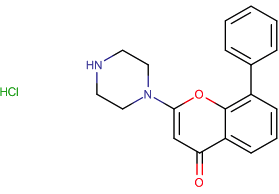
LY303511 hydrochloride
CAS No. 2070014-90-1
LY303511 hydrochloride( —— )
Catalog No. M18222 CAS No. 2070014-90-1
LY303511 (NV-128)is a potent mTOR inhibitor.
Purity : >98% (HPLC)
 COA
COA
 Datasheet
Datasheet
 HNMR
HNMR
 HPLC
HPLC
 MSDS
MSDS
 Handing Instructions
Handing Instructions
| Size | Price / USD | Stock | Quantity |
| 5MG | 68 | Get Quote |


|
| 10MG | 115 | Get Quote |


|
| 25MG | 237 | Get Quote |


|
| 50MG | 444 | Get Quote |


|
| 100MG | 646 | Get Quote |


|
| 200MG | Get Quote | Get Quote |


|
| 500MG | Get Quote | Get Quote |


|
| 1G | Get Quote | Get Quote |


|
Biological Information
-
Product NameLY303511 hydrochloride
-
NoteResearch use only, not for human use.
-
Brief DescriptionLY303511 (NV-128)is a potent mTOR inhibitor.
-
DescriptionLY303511 (NV-128)is a potent mTOR inhibitor.
-
In VitroLY303511 is structurally identical to LY294002 except for a substitution of -O for -NH in the morpholine ring, and does not potently inhibit PI3K. Treatment of cells with LY303511 causes an increase in calcein spread similar to levels of LY294002. The ability of LY303511 to increase gap junctional intercellular communication (GJIC) does not occur concomitant with inhibition of phosphorylation of AKT as measured by immunoblotting. LY303511 enhances TRAIL sensitivity of SHEP-1 neuroblastoma cells via H2O2-MAPK activation and up-regulation of death receptors. SHEP-1 cells are exposed to varying concentrations of LY303511 (LY30), TRAIL, and a combination of the two (1 h preincubation with LY303511 followed by TRAIL for 4 hours). SHEP-1 cells are responsive to TRAIL (~10%, ~15%, and ~30% reduction in the surviving fraction at 25, 50, and 100 ng/mL, respectively); however, treatment with LY303511 (12.5, 25, or 50 μM) has no effect on cell viability. However, incubation of cells with LY303511 (25 μM) for 1 hour followed by 4 hours exposure to 50 ng/mL of TRAIL has a strong synergistic effect (~40% reduction in viable cells with LY303511+TRAIL versus ~15% with TRAIL alone). LY303511 is a negative control compound with respect to PI3K activity. In MIN6 insulinoma cells, Wortmannin (100 nM) has no effect on whole-cell outward K+ currents, but LY294002 and LY303511 reversibly block currents in a dose-dependent manner (IC50=9.0±0.7 μM and 64.6±9.1 μM, respectively). Kv2.1 and Kv1.4 are highly expressed in beta-cells, and in Kv2.1-transfected tsA201 cells, 50 μM LY294002 and 100 μM LY303511 reversibly inhibit currents by 99% and 41%, respectively. LY303511 blocks currents with an IC50 of 64.6±9.1 μM, with a maximal inhibition of ~90% at 500 μM (n≥5 cells at each concentration).
-
In VivoIntraperitoneal administration of vehicle or LY303511 (10 mg/kg/day) is performed when tumors reach a volume of ~150 mm3, at which time 35 mice have developed a tumor. After 21 days, >15% of the mice require euthanasia because of excessive tumor growth, and these data are censored due to unreliable estimates of average tumor volume. The administration of LY303511, 10 mg/kg/day, is sufficient to inhibit PC-3 tumor growth in vivo.
-
Synonyms——
-
PathwayOthers
-
TargetOther Targets
-
RecptormTOR inhibitor
-
Research AreaCancer
-
Indication——
Chemical Information
-
CAS Number2070014-90-1
-
Formula Weight342.82
-
Molecular FormulaC19H19ClN2O2
-
Purity>98% (HPLC)
-
SolubilityIn Vitro:?DMSO : 25 mg/mL (72.92 mM)
-
SMILESCl.O=C2C=C(Oc1c(cccc12)c3ccccc3)N4CCNCC4
-
Chemical Name——
Shipping & Storage Information
-
Storage(-20℃)
-
ShippingWith Ice Pack
-
Stability≥ 2 years
Reference
1.Shi Y,etal.Computational modelling of LY303511 and TRAIL-induced apoptosis suggests dynamic regulation of cFLIP.Bioinformatics. 2013 Feb 1;29(3):347-54.
molnova catalog



related products
-
5-TAMRA-SE
5-TAMRA-SE is an amine-reactive fluorescent agent, its conjugates yield bright, pH-insensitive orange-red fluorescence (approximate excitation/emission maxima ~546/579) with good photostability.
-
Adipamidoxime
Adipamidoxime is an active compound.
-
4-Chlorocinnamic aci...
4-Chlorocinnamic acid is a photosensitive compound. 2-Chlorocinnamic acid and 4-chlorocinnamic acid show potent urease inhibitory activities with the respective IC50 values of 0.66 and 1.10 uM.



 Cart
Cart
 sales@molnova.com
sales@molnova.com


